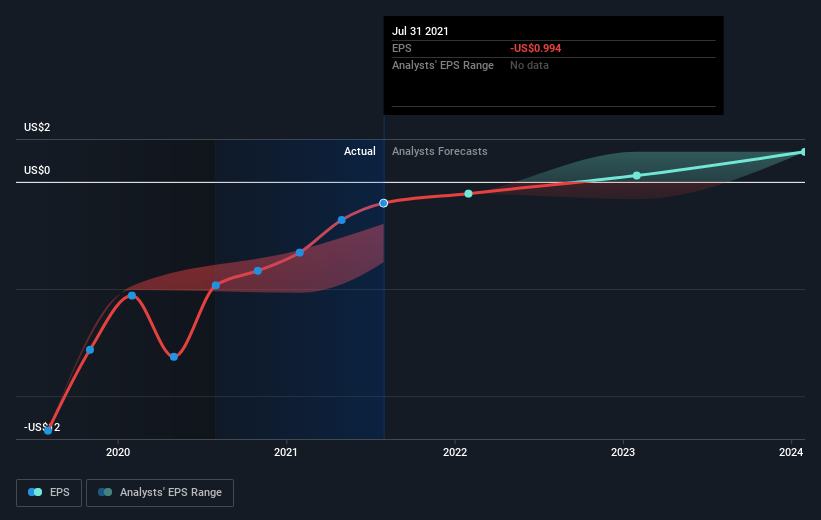GameStop Corp.'s (NYSE:GME) Shift From Loss To Profit
With the business potentially at an important milestone, we thought we'd take a closer look at GameStop Corp.'s (NYSE:GME) future prospects. GameStop Corp., a specialty retailer, provides games and entertainment products through its e-commerce properties and various stores in the United States, Canada, Australia, and Europe. The US$13b market-cap company’s loss lessened since it announced a US$215m loss in the full financial year, compared to the latest trailing-twelve-month loss of US$67m, as it approaches breakeven. Many investors are wondering about the rate at which GameStop will turn a profit, with the big question being “when will the company breakeven?” We've put together a brief outline of industry analyst expectations for the company, its year of breakeven and its implied growth rate.
See our latest analysis for GameStop
Consensus from 4 of the American Specialty Retail analysts is that GameStop is on the verge of breakeven. They anticipate the company to incur a final loss in 2022, before generating positive profits of US$35m in 2023. So, the company is predicted to breakeven approximately 2 years from today. What rate will the company have to grow year-on-year in order to breakeven on this date? Using a line of best fit, we calculated an average annual growth rate of 119%, which is rather optimistic! Should the business grow at a slower rate, it will become profitable at a later date than expected.
We're not going to go through company-specific developments for GameStop given that this is a high-level summary, however, take into account that by and large a high forecast growth rate is not unusual for a company that is currently undergoing an investment period.
One thing we’d like to point out is that The company has managed its capital judiciously, with debt making up 2.6% of equity. This means that it has predominantly funded its operations from equity capital, and its low debt obligation reduces the risk around investing in the loss-making company.
Next Steps:
This article is not intended to be a comprehensive analysis on GameStop, so if you are interested in understanding the company at a deeper level, take a look at GameStop's company page on Simply Wall St. We've also compiled a list of relevant aspects you should further examine:
Historical Track Record: What has GameStop's performance been like over the past? Go into more detail in the past track record analysis and take a look at the free visual representations of our analysis for more clarity.
Management Team: An experienced management team on the helm increases our confidence in the business – take a look at who sits on GameStop's board and the CEO’s background.
Other High-Performing Stocks: Are there other stocks that provide better prospects with proven track records? Explore our free list of these great stocks here.
Have feedback on this article? Concerned about the content? Get in touch with us directly. Alternatively, email editorial-team (at) simplywallst.com.
This article by Simply Wall St is general in nature. We provide commentary based on historical data and analyst forecasts only using an unbiased methodology and our articles are not intended to be financial advice. It does not constitute a recommendation to buy or sell any stock, and does not take account of your objectives, or your financial situation. We aim to bring you long-term focused analysis driven by fundamental data. Note that our analysis may not factor in the latest price-sensitive company announcements or qualitative material. Simply Wall St has no position in any stocks mentioned.

 Yahoo News
Yahoo News 

